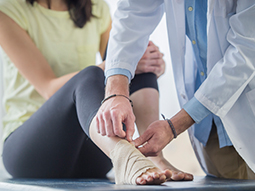This is a minimally invasive surgical procedure that gives doctors a clear view of the inside of the knee, which helps in the diagnosis and treatment of problems. During the procedure, the surgeon inserts an arthroscope, a small camera instrument about the size of a pencil, into the knee joint. The scope sends the image to a television monitor, allowing the surgeon to see the structures of the knee in great detail.
If surgical treatment is needed, your surgeon will insert tiny instruments through another small incision. These instruments might be scissors, motorized shavers, or lasers. This makes it possible for the surgeon to perform a range of procedures to repair damage to the meniscus, articular cartilage, or other soft tissues surrounding the joint. This includes smoothing or repairing torn cartilage, trimming bone spurs, and removing inflamed tissue.
Recovery from this procedure is much faster than recovery from traditional open knee surgery. You should be able to return to most physical activities after 6 to 8 weeks, or sometimes much sooner. Higher impact activities may need to be avoided for a longer time. You will need to talk with your doctor before returning to intense physical activities
Our providers

Expert orthopedic care
Getting the care you need starts with seeing one of our knee surgeons.
Additional information
Condition
Knee Swelling
Knee swelling also called a knee effusion or water on the knee, can make the knee feel unstable by increasing the space between the femur, tibia, and patella. There are many causes of knee swelling including injuries such as ligament…
Condition
Articular Cartilage Damage
Articular cartilage is the smooth, white tissue that covers the ends of bones where they come together to form joints. Healthy cartilage in our joints makes it easier to move. It allows the bones to glide over each other with…
Condition
Patella Instability
Patellar instability is a form of knee instability caused by an unstable kneecap. There are many causes of patellar instability such as an abnormally shaped femur or an abnormally aligned knee. Patellar dislocations can occur in an otherwise normal knee…
Condition
Knee Instability
Knee instability is the sensation of the knee giving out and is usually the result of an injury to a ligament. Injuries to one or more ligaments can lead to the two sides of the joint not being held tightly…
Condition
Meniscus Tear
The meniscus is a piece of cartilage in the knee that serves as a shock absorber between the ends of the leg bones, helps lubricate the joint, and distributes body weight across the joint. Meniscal tears are typically caused by…
Condition
Ligament Tear
Tears of the knee ligaments are common among active individuals. Twisting, hyper-extending and hyper-flexing the knee can all cause knee ligament injuries. In addition to swelling and pain, many patients complain of a sense of looseness, sloppiness or giving way…
Condition
Knee Pain
Knee pain is a common problem that can originate in any of the bony structures compromising the knee joint, the kneecap, or the ligaments and cartilage of the knee. Knee pain can affect people of all ages. It may be…









